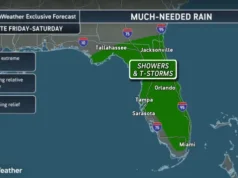
But the court can move fast when it wants to, busting through protocols and conventions. It did so around 1 a.m. on Saturday, blocking the Trump administration from deporting a group of Venezuelan migrants accused of being gang members under a rarely invoked 18th-century wartime law.
The court’s unsigned, one-paragraph order was extraordinary in many ways. Perhaps most important, it indicated a deep skepticism about whether the administration could be trusted to live up to the key part of an earlier ruling after the government had deported a different group of migrants to a prison in El Salvador.
That unsigned and apparently unanimous ruling, issued April 7, said that detainees were entitled to be notified if the government intended to deport them under the law, “within a reasonable time,” and in a way that would allow the deportees to challenge the move in court before their removal.
There were indications late Friday that the administration was poised to violate both the spirit and letter of that ruling. Lawyers for the detainees said their clients were given notices that they were eligible to be deported under the law, the Alien Enemies Act. The notices were written in English, a language many of them do not speak, the lawyers said. And they provided no realistic opportunity to go to court.
The American Civil Liberties Union, racing against the clock, filed its emergency application to the Supreme Court on Friday evening — Good Friday, as it happened — and urged the court to take immediate action to protect the detainees as part of a proposed class action.
The lawyers told the court that they feared their clients could be deported within hours, saying that some had already been loaded onto buses, presumably to be taken to the airport.
The Supreme Court did act fast. “The government is directed not to remove any member of the putative class of detainees from the United States until further order of this court,” the order said.
Disclaimer
Artificial Intelligence Disclosure & Legal Disclaimer
AI Content Policy.
To provide our readers with timely and comprehensive coverage, South Florida Reporter uses artificial intelligence (AI) to assist in producing certain articles and visual content.
Articles: AI may be used to assist in research, structural drafting, or data analysis. All AI-assisted text is reviewed and edited by our team to ensure accuracy and adherence to our editorial standards.
Images: Any imagery generated or significantly altered by AI is clearly marked with a disclaimer or watermark to distinguish it from traditional photography or editorial illustrations.
General Disclaimer
The information contained in South Florida Reporter is for general information purposes only.
South Florida Reporter assumes no responsibility for errors or omissions in the contents of the Service. In no event shall South Florida Reporter be liable for any special, direct, indirect, consequential, or incidental damages or any damages whatsoever, whether in an action of contract, negligence or other tort, arising out of or in connection with the use of the Service or the contents of the Service.
The Company reserves the right to make additions, deletions, or modifications to the contents of the Service at any time without prior notice. The Company does not warrant that the Service is free of viruses or other harmful components.












